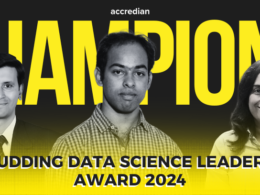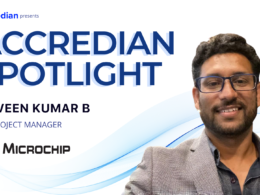Throughout the 17 years of his career graph, Umesh Kumar Roy has come far and wide transitioning from a developer to a Big Data engineer. Now it’s time for him to go for his next adventure. Enthralled by the potential Data Science, ML, and AI holds in augmenting businesses across industries, learning data science became his only goal and he enrolled for the Global Certificate in Data Science (GCD) program at Accredian.
In this interview, let’s take a look at what he thinks the goal of data science is and how his experience has been at Accredian.
Question 1: Which program & batch are you part of at Accredian & tell us more about your current work profile?
Umesh: I am part of the Global Certificate in Data Science (GCD) program, March 2020 batch. For the two years I have been handling ETL projects on a Big Data platform called Hadoop Ecosystem. I am also using technologies like MapReduce Yarn, HDFS, Hive HBase, Apache Zookeeper.
I am working in the population health domain as a senior software engineer and am responsible for handling a cross functional team, driving client relationships to understand the project and finalize it’s scope on a quarterly basis. I also oversee review releases published in the backlog by respective stakeholders and prepare technical feasibility documents.
I am also responsible for guiding and mentoring source developers for the project, spearheading multi disciplinary collaborations using a child framework and steering real time client delivery with reduced organization risk.
Question 2: Walk us through your career journey & what got you interested in Data Science & Machine Learning?
Umesh: I have over 17 years of experience with 3+ years in Visual Basic and 12 years of experience in analysis, design, and development of enterprise level application using Java j to web technologies.
I started my career as an application developer encompassing diverse domains like financial, accounting, payroll, inventory, and US healthcare insurance. I’m really lucky to get an opportunity to transition myself to Big Data in the Population Health domain.
Here, I got the flavor of transitioning myself through RDBMS and embraced the nuances of future digitization. The world is moving towards a paradigm shift through data collection points.
With internet usage growing in leaps and bounds, the volume, velocity, variance and veracity of data has completely changed the approach of business analysis. In every facet of business, there is a clear growing demand of predictive analytics.
And automation has been coined as the key to success of any business. Now, I can inherently visualize that there needs to be a model, which should protect the future accurately to have a direct impact on revenue, and hence my interest towards learning data science and machine learning.
And the other reason for learning data science is completing this spectrum of experience, right from being an application developer to Big Data engineer to a data scientist, I had a long stint in application development.
And somehow, I was losing interest in executing similar kinds of work which is capturing data through a user interface and dumping them into a relational database management system for future analysis, and ETL processing.
My flair for keeping myself updated with trending technologies pushed me into learning data science. And the realization of the fascinating field of data science. Bringing data to life really changed my perspective.
The capability of a data scientist to turn seemingly meaningless data into a recommendation to help a company improve its product, service or experience is wonderous.
The field of data science is the career of the future. Its insights and innovations can be applied to almost all the sectors such as retail, e commerce, travel, healthcare, among others.
Question 3: What all tools and packages in Data Science & Machine Learning have you mastered in your Data Science & AI program at Accredian so far?
Umesh: I have enhanced my knowledge on some statistical concepts and tools like Python, NumPy, Pandas, Scikit-Learn Matplotlib, Pi Carrot and C bar. While learning data science, I have also embraced multiple algorithms like linear regression, logistic regression, decision trees, random forest, k means, k nearest neighbor, principal component analysis, support vector machine time series analysis, linear discriminant analysis, recommender system and anomaly detection and yet to cover more.
Question 4: What were some of the initial challenges when you got started on your Data Science journey and how did you overcome it?
Umesh: I have a software programming background. So working on Python has never been a challenge. But doing the mathematical part of the machine learning algorithm has been really challenging in some cases. I’m going through some of the additional materials to gain more knowledge by referring to Google.
Question 5: Who is your favorite faculty at Accredian and what did you learn from him the Most?
Umesh: All the faculties of Accredian are great, but Deepesh and Suchit have really impressed me a lot. The way they impart training is really great. And the most commendable part is the ability to focus on the theoretical part of the game.
Question 6: What is the goal of Data Science?
Umesh: Data is the new electricity. We are living in the age of the fourth industrial revolution. This is the era of artificial intelligence and big data. There is a massive data explosion that has resulted in the culmination of new technologies and smarter products.
Around 2.5 exabytes of data is created each day. The need for data has risen tremendously in the last decade. The goal of data science is to construct the means for extracting business focused insights from data.
This requires an understanding of how value and information flows in a business and the ability to use that understanding to identify business opportunities. The principal purpose of data science is to find patterns within data.
It uses various statistical techniques to analyze and draw insights from the data. From the data extraction, wrangling and pre processing, a data scientist must scrutinize the data thoroughly. Then he has the responsibility of making predictions from the data.
The goal of data scientists, therefore, is to derive conclusions from the data. Through these conclusions they are able to assist companies in making smarter business decisions.
Question 7: In your view, how has Data Science evolved in the last few years?
Umesh: Data Science is a very recent terminology. Before data science, we had statisticians. These statisticians performed qualitative analysis of data, and companies employed them to analyze their overall performance.
Since the advent of computation, cloud storage and analytical tools, the field of computer science has merged with statistics. This gave birth to data science, knowingly or unknowingly. And, right now, we are using data science in almost all the spheres of life.
Question 8: What are the current trends in Data Science that you are most excited about?
Umesh: Train is the general direction of a price over a period of time. By the end of 2024, 75% of enterprises will shift from piloting to operationalizing AI, driving a five times increase in streaming data and analytics infrastructure. AI and machine learning are critical in realigning supply and the supply chain to win new demand patterns and trends.
Question 9: Which are some of the blogs that you follow?
Umesh: I follow blogs from some of the sites like Kaggle, Towards Data Science and AnalyticsVidhya.
Question 10: What is your advice to anyone wanting to start a career in Data Science?
Umesh: My suggestion for anyone wanting to start a career in data science would be to know the subject thoroughly and be very, very proficient with Python. I would recommend the principle of “practice makes a man perfect”. Practice is the main mantra of success.
Talk to people in the industry like data scientists, business analysts, data analysts, or ML engineers to figure out what each of them work upon and what suits their tech mentorships, request them for a small amount of time and ask relevant questions.
I’m sure no one would refuse to help a person in need. Before learning data science, figure out what you want to be and what you are good at, and choose the role that suits your field of study. And always work on strengths rather than working on the weaknesses.
This was a conversation with one of our GCD students – Umesh Kumar Roy.
If you want to read more interesting student interviews, check out Accredian Spotlight.





